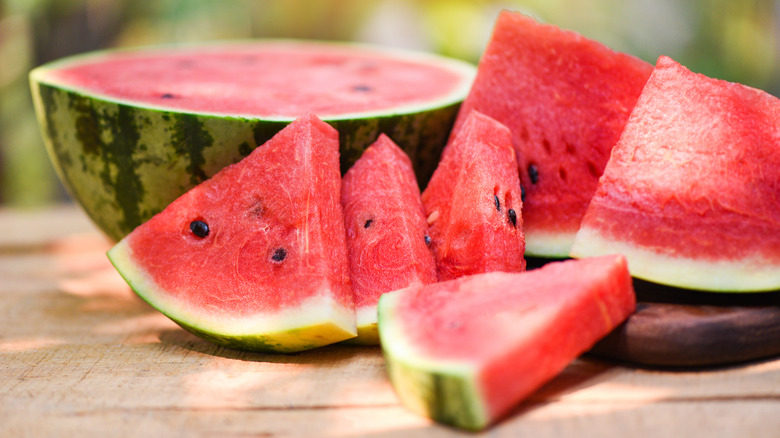The Downsides Of Eating Too Much Watermelon
On a sunny summer day, few things hit the spot better than biting into a juicy slice of watermelon while sitting poolside. Watermelon is a vitamin-rich fruit that offers many tasty health benefits. Just the amino acids and antioxidants found in watermelon alone can work wonders. A spokesperson and registered dietitian for the Academy of Nutrition and Dietetics, Angela Lemond, elaborates, stating, "Foods that are high in antioxidants and amino acids allow your body to function optimally. Amino acids are the basic building block for protein, and protein is used in virtually every vital function in the body" (via Live Science).
Predominantly made up of water, watermelon can keep us hydrated, boost digestive health, and may reduce the risk for certain cancers, according to Live Science. To maintain our health, experts advise regularly incorporating all the main food groups into our meals including dairy, grains, protein, and vegetables and fruits (via U.S. Department of Agriculture). But is it possible to eat too much fruit — specifically watermelon?
What is a safe amount of watermelon?
While watermelon is no doubt nutritious, it does contain lycopene, the pigmented antioxidant that gives watermelon its unique coloring (via WebMD). However, too much of it can be problematic.
A 2014 study in the Experimental and Clinical Sciences Journal found that the amount of lycopene in watermelon significantly exceeds that of the amount found in red tomatoes. And 2003 research determined that overconsumption of carotenoid-containing foods (i.e., watermelon) can lead to the development of a condition known as carotenoderma, which is characterized by a yellow-orange pigmentation of the skin (via DermNet).
Lastly, it is possible that ingesting excessive amounts of watermelon can overhydrate the body. In severe cases, this can lead to water intoxication, which is the dilution of the body's sodium levels that can lead to nausea, vomiting, and fatigue, according to WebMD. To ensure you're not eating too much lycopene, nutrition experts suggest sticking to 30 milligrams maximum of lycopene daily (per Live Science).


